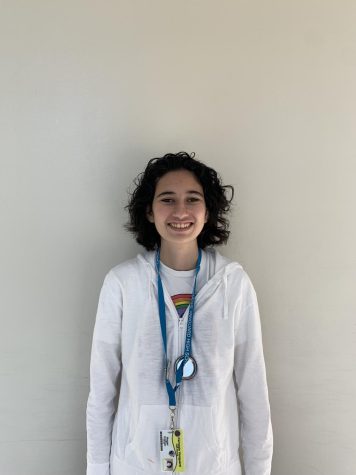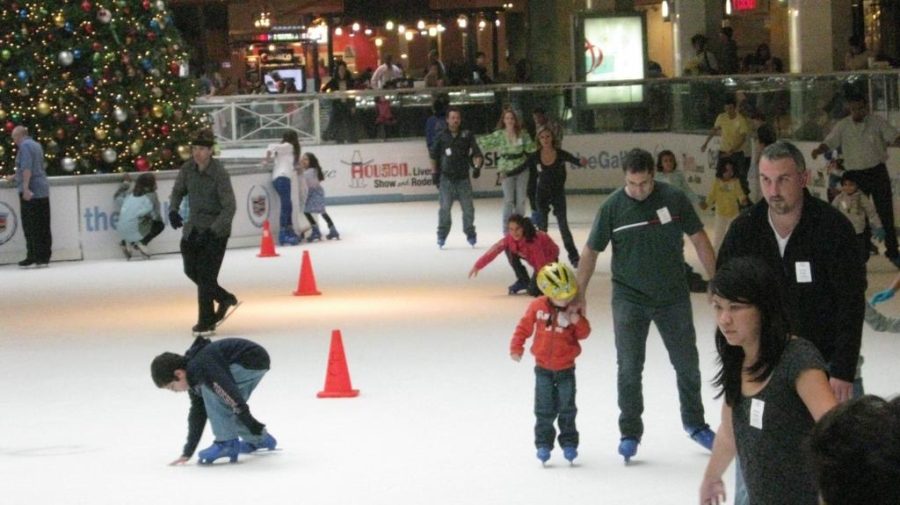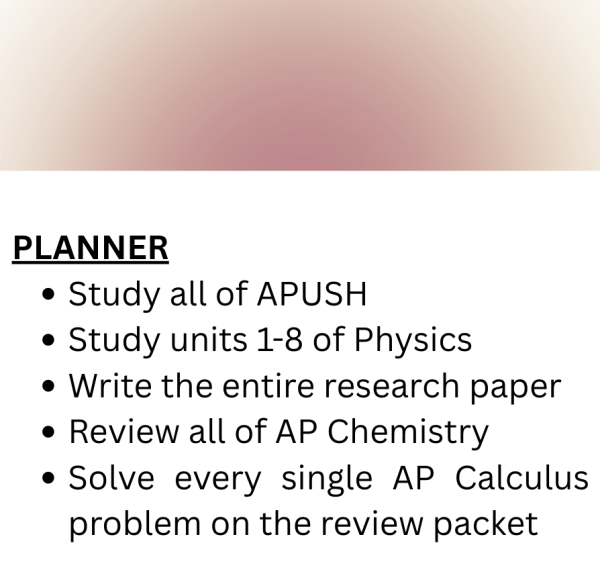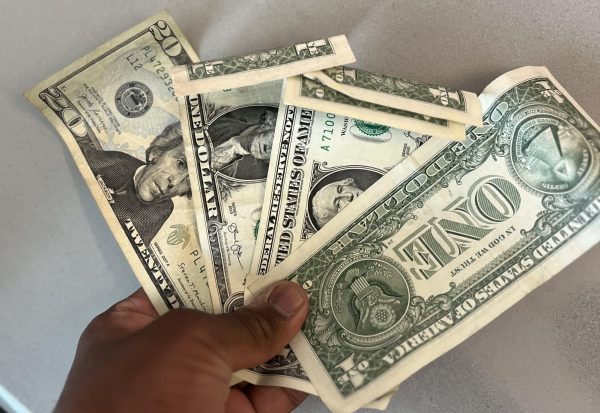Personal Column: Is Hanukkah really Jewish Christmas?
Me and my family Ice Skating at the Galleria around a huge Christmas Tree
I never look forward to December.
The topic of conversation is anything and everything. It’s junior year. We laugh at each other and eat our lunches, as on the inside, our stress is building up. Finals are approaching, and so are the holidays. The school is decorated for Christmas, and the spirit of winter and snow is evident through everyone. She turns to me and asks me a simple question: “What should I get you for Christmas?”
I didn’t know how to respond, but before I could think through it in my brain, my mouth talked first. “I celebrate Hanukkah, not Christmas.” She turned to me and laughed, and the next thing she said kick-started a tradition that we adopted. “Let me rephrase,” she starts. “What should I get you for Gift Giving Capitalism Fun Time?”
It wasn’t until the beginning of second grade when I learned about the holiday of Christmas. As an Israeli immigrant to the United States, I hadn’t realized that it’s one of the biggest holidays that is celebrated by my peers. They talked about things I didn’t understand. Apparently there was a guy living in the north pole named Santa Claus who snuck into people’s houses on a specific night, trees decorated with lights, celebration of the birth of Jesus Christ, reindeers who can fly, and an elf who put you on a “nice list” or a “naughty list” (elf on the shelf, creepy much?). Christmas songs like “All I Want for Christmas is you”, “The Jingle Bell Rock”, and the very stalker-ish “Santa Claus is Coming to Town” blared through the radio, all sounding eerily similar. That was when I knew I had to find some way to bring the holiday home.
My brother and I begged our dad to decorate the house with “Christmas lights” one day, our clothes rack as a “Christmas tree” and left out a random shaker made of styrofoam cups with rice inside and decorated with Christmas stickers for Santa. My dad went along with our requests, knowing it wasn’t going to turn into a lasting tradition. Only a year later, I started recognizing my dad’s handwriting as a letter that Santa left for us, effectively bursting that bubble. “He wrote ‘S.C’ at the bottom,” I told my brother. “Santa doesn’t sign his letters with ‘S.C’. All of his letters that I’ve seen were signed ‘Santa Claus’.”
One thing my peers were most excited about when it came to the holiday season was watching Christmas movies in school on the last day before winter break. Rudolph the Red-Nosed Reindeer, Frosty the Snowman, and The Polar Express graced the Smartboard screen as we ate candy canes and sweets. Most people seemed to know what was happening in these movies that defined their childhoods. Line by line, song by song, minute by minute. The room filled with kids singing in unison, “”It’s a magic carpet on a rail / Never takes a rest / Flying through the mountains and the snow / You can ride for free and join the fun / If you just yes! / ‘Cause that’s the way things happen / On the Polar Express / You bet!”. Afterwards, we would have an ugly sweater contest. I was told my sweater wasn’t really an ugly sweater, and then we would trade gifts through White Elephant and Secret Santa.
“There’s a letter for you on the kitchen counter,” my mom told me one day when I was in middle school.
I walked to the kitchen, confused. “Who wrote me a letter?” My mom shrugged. As it turned out, that was when my non-Jewish friends started sending me their annual Christmas cards.
Something I didn’t realize until very recently was that as much as I had to learn about Christmas, my peers would have to learn about Hanukkah (and the 1,000 different ways it’s spelled). Other than the wrongly-lit menorahs I would usually see in school, or the annual holiday houses exhibit at the Children’s Museum in Houston, there wasn’t any accurate or true representation of what Hanukkah actually celebrates. I’d seen copy-cat Christmas symbols re-decorated for Hanukkah, such as “Hanukkah Ugly Sweaters” and “Hanukkah trees”. Every year there is one person who posts a picture of a menorah that has the wrong number of candle holders, which gets posted on story after story on social media.
A couple of times when we visited Israel, it just so happened to be Hanukkah. It was nearly sunset in December, and my family was driving to my aunt’s house. The radio was blaring Hanukkah songs, which I only noticed halfway through the drive due to the fact that I was sleeping off the jet lag. “I’ve never heard this many Hanukkah songs,” I tell my parents. “Why are they suddenly playing so many at once?” As I would soon find out, Hanukkah songs in Israel are just as significant as Christmas songs in the United States.
November and December in Israel don’t look that different from November and December in the United States. The street signs advertise different Hanukkah specials and parades, the bakeries are filled to the brim with sufganiyot (donuts with fillings). Apartments provide a glimpse of their lives with menorahs prepped on window sills, the smell of freshly fried foods filling the outside air. Although Hanukkah isn’t considered a major Jewish holiday, it’s still celebratory and a special occasion.
When Hanukkah falls while we are in the United States, we usually compensate with Facetime candle lightings. One particular memorable call happened when I was in 8th grade, my brother and I still in our pajamas, daylight streaming through our room. On the other side, my grandmother, grandfather, and aunt were lighting candles, night evident through their window. The five of us lit the first candle of Hanukkah together, singing the songs together and laughing.
Hanukkah is a holiday that celebrates the reclaiming of the second temple of Jerusalem, and the fact that oil in the menorah of the temple that was only supposed to last 1 day actually lasted for 8 days. The menorahs that are lit today have nine candle cups, and the middle one is called the shamash. Usually, every night the shamash and however many candles symbolize the day are lit. For example, on the first night, the shamash and the first candle are lit. On the second night, the shamash and the first two candles are lit. This continues for 8 days. In addition, we eat fried foods, sing songs, and play with a clay spinner called a dreidel, which the Jewish people played with while the second temple was captured by the Greeks. The dreidel has 4 letters, each representing a word in the phrase “A miracle happened here” (when in Israel). Outside of Israel, the word “here” is usually replaced with “there”. The game is usually played with gelt (chocolate coins), and the letter that is spun determines how much gelt each person gets.
The Jewish community in Houston also comes together to celebrate Hanukkah with menorah lightings at the Jewish Community Center and inflatable decorations of several significant Hanukkah symbols. The smell of fried foods still fills the outside air from Jewish homes, and menorahs are still propped on window sills. The Hanukkah spirit is just as alive as the Christmas spirit in my community.
My Jewish friend and I started a tradition in middle school where we play the game of dreidels with pencils instead of gelt. Spin, plop, spin, plop. Our game encompasses several minutes as people come and go, asking about the game and the holiday.
Although I don’t personally celebrate or know much about Christmas, I feel that the traditions I partake in are just as important as my own Hanukkah traditions. Celebrating Hanukkah, talking about it with my non-Jewish friends, and teaching others about my traditions has brought me closer not only to my own identity, but to my peers as a whole.
As the years go on, more and more people are embracing and learning about traditions other than their own, and my friend and I’s tradition of “Gift Giving Capitalism Fun Time” is the direct proof of that acceptance.
“Are we still going to celebrate Gift Giving Capitalism Fun Time this year?” I asked my friend while we were walking down the stairs in school one day. It is senior year now, and the holiday spirit is once again evident throughout the hallways. “Of course we are,” she laughs. “It’s Gift Giving Capitalism Fun Time, what do you expect?”
I always look forward to December now.
Your donation will support the student journalists of Carnegie Vanguard High School. Your contribution will allow us to cover our annual website hosting costs and fund field trips, competition fees, and equipment. We appreciate your support!

Hagar enjoys expressing herself through writing, but also through admiration of the fine arts as a whole. She sees it as a way to show how she is feeling...







Yuval • Dec 14, 2022 at 11:56 am
W opinion
Rinn Wilson • Dec 13, 2022 at 10:19 am
Love the descriptors, everything was really put together and I enjoyed the parallels present through the article 😀